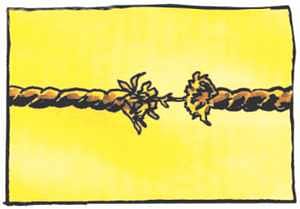| Home - Back Issues - The Team - Contact Us |
 |
| Volume 10 |Issue 49 | December 30, 2011 | |
|
|
Health Stressed Out Stress can come from any situation or thought that makes you feel frustrated, angry, or anxious. What is stressful to one person is not necessarily stressful to another. Anxiety is a feeling of apprehension or fear. The source of this uneasiness is not always known or recognized, which can add to the distress you feel. Certain drugs, both recreational and medicinal, can lead to symptoms of anxiety due to either side effects or withdrawal from the drug. Such drugs include: alcohol, amphetamines, bronchodilators for asthma, caffeine, cocaine, cold remedies, decongestants, diet pills, nicotine, thyroid medications and tricyclic antidepressants.
The most effective solution is to find and address the source of your stress or anxiety. Unfortunately, this is not always possible. A first step is to take an inventory of what you think might be making you "stress out": What do you worry about most? Is something constantly on your mind? Does anything in particular make you sad or depressed? Keep a diary of the experiences and thoughts that seem to be related to your anxiety. Are your thoughts adding to your anxiety in these situations? Then, find someone you trust (friend, family member, neighbour, clergy) who will listen to you. Often, just talking to a friend or loved one is all that is needed to relieve anxiety. Most communities also have support groups and hotlines that can help. Social workers, psychologists, and other mental health professionals may be needed for therapy and medication. Also, find healthy ways to cope with stress. For example: Eat a well-balanced, healthy diet. Don't overeat. Get enough sleep. Exercise regularly. Limit caffeine and alcohol. Don't use nicotine, cocaine, or other recreational drugs. Learn and practice relaxation techniques like guided imagery, progressive muscle relaxation, yoga, tai chi, or meditation. Try biofeedback, using a certified professional to get you started. Take breaks from work. Make sure to balance fun activities with your responsibilities. Spend time with people you enjoy. Find self-help books at your local library or bookstore. Source: The Internet
Copyright (R) thedailystar.net 2011 |
 Diagnosing anxiety is difficult and complex because of the variety of possible causes and because each person's symptoms arise from highly personalized and individualized experiences. When a doctor examines an anxious patient, he or she will first rule out physical conditions and diseases that have anxiety as a symptom. The doctor will then take the patient's history to see if prescription drugs, alcohol or drug abuse, caffeine, work environment, or other external stressors could be triggering the anxiety. In most cases, the most important source of diagnostic information is the patient's psychological and social history. The doctor may administer several brief psychological tests.
Diagnosing anxiety is difficult and complex because of the variety of possible causes and because each person's symptoms arise from highly personalized and individualized experiences. When a doctor examines an anxious patient, he or she will first rule out physical conditions and diseases that have anxiety as a symptom. The doctor will then take the patient's history to see if prescription drugs, alcohol or drug abuse, caffeine, work environment, or other external stressors could be triggering the anxiety. In most cases, the most important source of diagnostic information is the patient's psychological and social history. The doctor may administer several brief psychological tests.